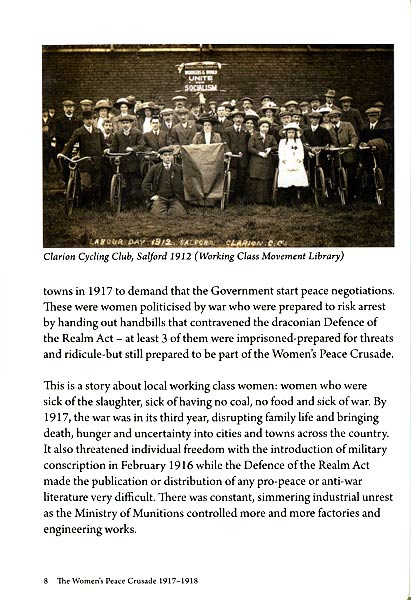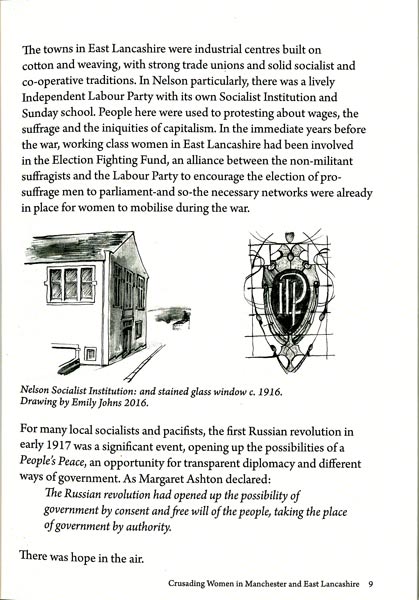
'THE GREAT WAR', 'THE WAR TO END WAR', 'WORLD WAR 1'
'What passing-bells for these who die as cattle?
- Only the monstrous anger of the guns.'
from 'Anthem for Doomed Youth'
by Wilfred Owen
From the Publication 'The Women's Peace Crusade, 1917-1918 : Crusading Women in Manchester & East Lancashire' |
|
|
towns in 1917 to demand that the Government start peace negotiations. These were women politicised by war who were prepared to risk arrest by handing out handbills that contravened the draconian Defence of the Realm Act - at least 3 of them were imprisoned - prepared for threats and ridicule - but still prepared to be part of the Women's Peace Crusade. This is a story about working class women; women who were sick of the slaughter, sick of having no coal, no food and sick of war. By 1917, the war was in its third year, disrupting family life and bringing death, hunger and uncertainty into cities and towns across the country. It also threatened individual freedom with the introduction of military conscription in February 1916 while the Defence of the Realm Act made the publication and distribution of any pro-peace or anti-war literature very difficult. There was a constant, simmering industrial unrest as the Ministry of Munitions controlled more and more factories and engineering works. Page 8
|
|
The towns in East Lancashire were industrial centres built on cotton and weaving, with strong trade unions and solid socialist and co-operative traditions. In Nelson particularly, there was a lively Independent Labour Party with its own Socialist Institution and Sunday School. People here were used to protesting about wages, the suffrage and the iniquities of capitalism. In the immediate years before the war, working class women in East Lancashire had been involved in the Election Fighting Fund, an alliance between the non-militant suffragists and the Labour Party to encourage the election of pro-suffrage men to Parliament - and so - the necessary networks were already in place for women to mobilise during the war. For many local socialists and pacifists, the first Russian revolution in early 1917 was a significant event, opening up the possibilities of a People's Peace, an opportunity for transparent diplomacy and different ways of government. As Margaret Ashton declared:
Page 9 |
Return to Pages 6 & 7 Go to Pages 10 & 11
Return
to Peace Crusade Project page & Book Contents List |
Return
to Campaigning for Peace page |
If you have Oldham and District items that we can include on our website, PLEASE visit the information page to find out how you can help.

